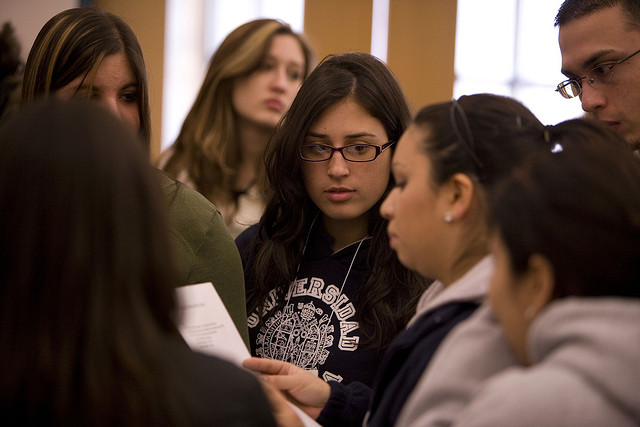The Emergence of Latino Studies

By Arthur D. Soto-Vásquez, NewsTaco
University departments previously established as Mexican-American, Puerto Rican and Cuban-American studies are being refashioned as “Latino Studies” at public universities and colleges throughout the United States. For example, the Center for Mexican-American Studies at The University of Texas at Austin is now the Department of Mexican American and Latino Studies. At the same time elite private institutions are also opening their own Latino Studies departments in accordance to pressure from students who want their history and culture to be studied. What is also important to understand is this trend is concurrently occurring alongside a national (and transnational) “Latino” project in the United States which aims to group people from disparate experiences and nationalities into one race.
There of course remains ambivalence among scholars about what this move towards a Latino studies paradigm will mean for the field. First, some scholars worry the field could lose its close ties to the community. Mexican American studies departments were often founded in areas where high proportions of Mexican Americans lived; see departments at The University of Texas at Austin and UCLA. Second, scholars also fear how the new field would integrate the foundational texts of its intellectual predecessors, especially when many were written in a time before the interdisciplinary nature of the field was firmly established.
In addition, there also exists another fundamental question to consider. How does the new field develop an understanding of Latinos when as NYU professor Juan Flores says, “the history of Latinos is already in midnarrative?” In other words, will the field shape our understanding of Latino identity or have powerful interests outside of our control already defined it? Even as the field may adopt a critical opposition to the term Latino, would there be a willingness in the field to abandon the term Latino itself?
While this seeming contradiction could be construed a weakness of the field, it should actually be understood as a strength. The willingness of the field to entertain a fundamental contradiction as a tension between the theoretical and practical use of “Latino” makes the field more vibrant and relevant. In this way, the field of Latino studies is engaging in an epistemological experiment rarely undertaken in the academy. Latino studies could thus bring vibrancy to its companion fields of ethnic studies and other liberal arts by integrating contradiction.
Dr. Nicole Guidotti-Hernandez, the chair of the new department of Mexican American and Latino Studies at UT, said in a recent interview with the Texas Tribune, “the expansion of the curriculum with the addition of Latina/o studies is that it allows us to account for historic Mexican-American populations alongside long-standing and rising groups like Central Americans, South Americans and people from the Caribbean that have a particular history in Texas.”
The field will also remain relevant because this contradiction is a part of the daily experience of Latinos in the United States. It allows for someone like me, a second-generation Mexican-American from El Paso who speaks English much better than Spanish, to call myself Latino. It also allows me to understand that my friends from the Bronx and Monterrey, MX (who look completely different) can also be Latino with me. This contradiction also allows me as a political activist to simultaneously challenge mainstream opinions about the “Latino electorate” while calling for and organizing a united Latino vote.
Ultimately, the creation of Latino studies departments at colleges and universities in the United States is a positive development. Indeed as new students enter the field, their intellectual labor will advance a better understanding of what it means to be Latino. This will only benefit their own intellectual development and the U.S. Latino community at large.
Arthur D. Soto-Vásquez is a proud native of El Paso, TX. He is currently a graduate student at The University of Texas at Austin and closely involved with political campaigns and issues relevant to U.S Latino community life.
[Photo by Lumina Foundation/Flickr]

